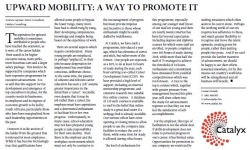Andrew Layman - Upward Mobility:A Way To Promote IT2019-03-04 The aspiration for upward mobility is sometimes attributed to people who have reached the extension, as
it were, of the career ladder. Their search is for higher executive status, more perks, more luxurious cars and a larger salary package. This tends to be supported by companies which have expensive programmes for executive advancement. It is as well that this support for the development and emergence of top executives is in place, for the country needs its businesses, its employers and its engines of economic growth to be led by South Africans, particularly those who have been marginalised from such leadership opportunities in the past. However, it is the section of the ladder from the ground that is relevant for most employees. While it has become increasingly true that qualifications have allowed some people to bypass the lower rungs, many more have had to climb rung by rung, their developing competencies, knowledge and insights being based on the experience of work. There are several aspects which require consideration. Many young people are misplaced, or perhaps ‘unplaced’, in their jobs because desperation for employment has overridden conscious, deliberate choice. At the same time, the paucity of cohesive and relevant career education has seen a ‘job’ assume greater importance in the mind than a ‘career’. Secondly, even despite that it may be job rather than a career, the employee must have aspirations and a determined enthusiasm to facilitate his or her own progress. Unfortunately, in many cases, school education may not have prepared young people to take responsibility for their own destiny. Then there is the employer and the workplace environment which must not only be conducive to the encouragement of progress but must provide impetus and incentive to those whose enthusiasm might be easily dulled by indifference. At Catalyx, we have such a programme, introduced a year ago, which has elements of carrot and stick, but rather more of the former. Our people are expected, as a KPI, to do at least 24 hours of study during the year, each hour earning a so-called Career Development Point (CDP). We have provided a high level of support, including an internal mentorship programme, and extensive research into suitable free online courses. A database of 120 such courses is available to staff in the belief that online study is a great deal easier if a webpage link is already available. Our various offices have extra opening or closing times to allow people to use the company data facilities to reduce the cost to them, while some time for study is allowed during office hours. The level of enthusiasm for this programme, especially among our younger staff (most of our staff are young and there are nearly twenty interns) has been far beyond expectation. Including degrees and diploma courses for which some staff are enrolled, 16 people completed over 400 hours of study during 2018, while more than half the staff of 75 managed to achieve the threshold of 24 hours. Enthusiasm and commitment have emanated from youthful competitiveness which was not foreseen. A race to the top is evident which, together with greater pressure from management beyond this pilot year, will draw others into the study-for-advancement regimen so that they too may feel the satisfaction of selfaccomplishment. For the employer, this type of facilitation is not the whole deal. If skills development does not relate to personal progress in one’s career, it has limited value. Opportunities for promotion in any company are restricted by staffing structures which often seem to be cast in stone. Perhaps the working world of our era requires less adherence to these, and much greater flexibility to recognise and move the talent upwards; creating posts for people, rather than putting people into posts. And if we can’t provide the further incentive of advancement, we should be happy to see their efforts rewarded elsewhere, for by this means our country’s workforce will be strengthened and all business will benefit. Contact Details T: 0861 888 985 E: info@catalyx.biz W: www.catalyx.biz |
Andrew Layman - Upward Mobility:A Way To Promote IT
Copyright © 2024 KwaZulu-Natal Top Business
